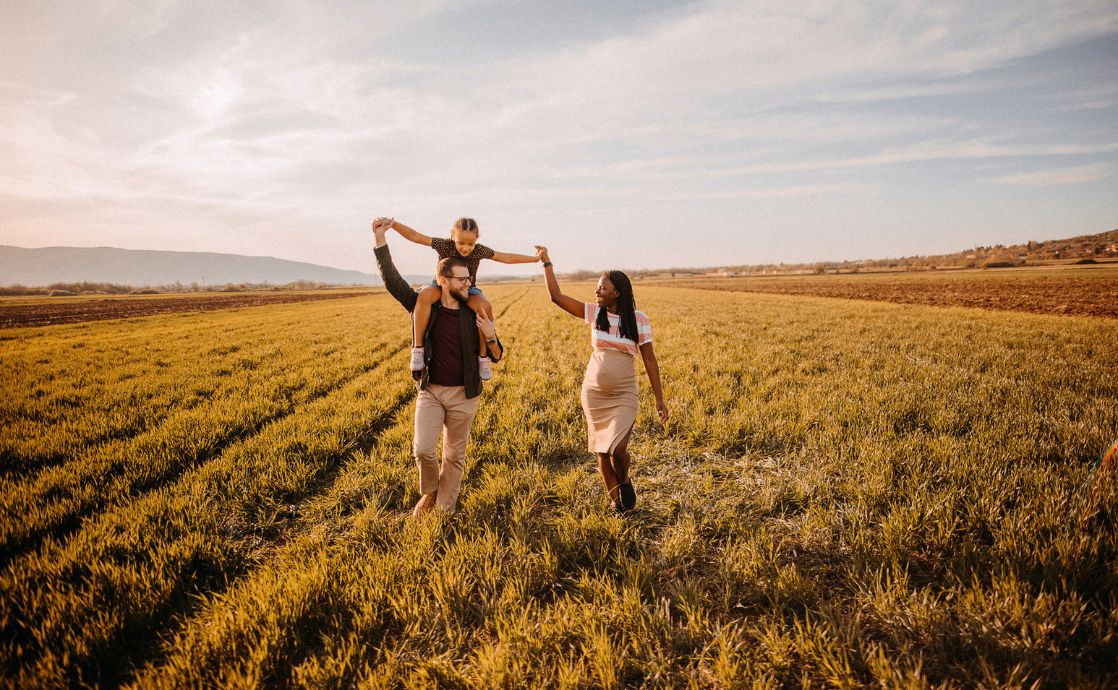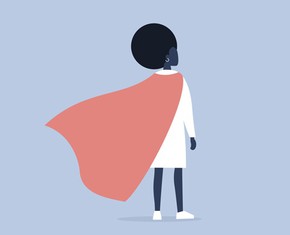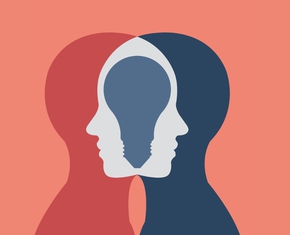The views expressed in our content reflect individual perspectives and do not represent the authoritative views of the Baha'i Faith.
Early in our marriage, when my wife Terri was out of town, and I was at home, the doorbell rang. When I looked out, I saw a scary vision: the silhouette of a Sheriff’s deputy, magnified either by his patrol car’s headlights or my imagination.
At the time, I was a recent transplant to the South, and interracially married, so fearful visions of a stereotypical Southern lawman ran through my head. (Over the years, I’ve probably altered details of this story to make it more entertaining, so let’s say it’s “based on real events.”)
In truth, the officer turned out to be a soft-spoken older gentleman with thick glasses, who told me my wife had been trying to reach me and was worried. Due to a comedy of errors in those days before cell phones, I had missed her calls.
RELATED: A Baha’i Prayer for the United States Government
Beneath the comedy, though, we can detect my cartoonish and often condescending perceptions toward the South, which I’ve had to unlearn and encourage everyone else to unlearn, too.
I’ve now lived in Georgia for a bit more than half my life. I married and raised a family here, became a respected reporter at a community newspaper, and continue to live in the small town of Fort Valley. I wouldn’t stay here if Georgia resembled the cartoonish place many of my fellow Yankees still envision.
Take, for example, my opening anecdote. It’s unlikely the NYPD would come to check on a husband who didn’t answer the phone for only a few hours. Such “welfare checks” are no problem around here.
I’ve grown to appreciate Southern manners. People still regularly say, “Yes, sir,” and “Yes, M’am.” Day-to-day interactions tend to be more civil than in sophisticated Northern cities. People get into conversations with strangers, even strangers from New York City.
If I’m trying to change a flat tire on the side of the road, it never takes long for someone to stop and assist me, even completely take over the job. Yes, that person might have a bumper sticker with a Confederate flag and the slogan “Pride, Not Prejudice,” but they never showed any prejudice toward me and my Black wife.
Also, Southern hospitality is a real thing. If you’re a guest at a Southern home, you’ll never lift a finger. You’ll likely leave smiling, belly bursting with ribs, collard greens, and cornbread.
What you’ve heard about Football Friday Nights is true. It’s a quasi-religious experience. I regularly attend those ‘services,’ where Black and White people gather and cheer their players of any race.
In my time in Georgia, I’ve made many friends — Black, White, Latino, and lots of other nationalities and ethnicities. The Baha’i teachings ask us to love all people, so I get along with liberals, conservatives, and Christians of many denominations and growing numbers of people of other faiths or those with no faith. The South is more diverse today than many outside the region might think.
Has the American South, then, become a paradise of mutual tolerance, where only the content of our character matters? Far from it — but neither has any other region of the country.
I’ve painted this rosy picture to accentuate the positive, with some hope of modifying the uninformed views of my Northern urban compatriots. I ask everybody to see my chosen home as a place where the good, the bad, and the ugly, and everything in between, can all co-exist and be true at the same time.
What of the bad and the ugly? The Civil War, slavery, and Jim Crow continue to cast long shadows over the Southern landscape. Across many social categories, such as poverty, crime, health, and education, Southern states exist at the wrong end of the rankings. There are exceptions, such as the recent great improvement in Mississippi’s reading scores that PBS called a “miracle.”
The word ‘persistent’ pervades discussions of all the problems listed above, along with an attendant sense of despair leaking from between the lines. But a transformative vision, as we saw in Mississippi, can change despair into rejoicing.
Although the Civil Rights movement fought its battles on the legal and social fronts, it was a transformative religious vision that inspired many of those warriors, who prevailed against mass arrests, water cannons, and police dogs simply through persistence, faith, and justice.
I and my fellow Baha’is are warriors against hatred, too. We confront not mob violence, but ignorance, racism, entrenched attitudes, and that rarely-acknowledged despair. Each day, we recite a prayer from Abdu’l-Baha, written especially for the Baha’is of the Southern states, that declares each of us, in our “lowliness and weakness,” is “occupied with the greatest undertaking,” determined to “raise Thy word among the masses and to spread Thy teachings among Thy peoples.” Our battle is to do our part to fulfill Abdu’l-Baha’s call for America to lead the world spiritually.
Only in the past couple of years have I paid attention to the transformative vision of the South that Abdu’l-Baha gave the Baha’is over 100 years ago. Abdu’l-Baha visited the United States in 1912. During that trip, he celebrated the nation’s energy, dynamism, prosperity, optimism, and freedom; he also urged the nation to overcome racism or face dire consequences.
A few years after that historic visit, he sent a series of letters to the Baha’is of the U.S. and Canada, focused on guiding our work of spreading the Baha’i teachings and principles of love, unity, and justice. Many of those letters addressed the Baha’is by geographic region. (In that formulation, the Southeastern States comprised Delaware, Maryland, Virginia, West Virginia, North Carolina, South Carolina, Georgia, Florida, Alabama, Mississippi, Tennessee, Kentucky, Louisiana, Arkansas, Oklahoma, and Texas.)
RELATED: How Can the United States Establish Equity and Equality?
A February 1917 letter to the Baha’is of the Southeastern States included the prayer quoted above. That letter begins with a startling analogy — Abdu’l-Baha asserts that history’s great minds agree that:
… the most ideal region for the habitation of man is the temperate zone, for in this belt the intellects and thoughts rise to the highest stage of maturity, and the capability and ability of civilization manifest themselves in full efflorescence.
He continued:
When you read history critically and with a penetrating eye, it becomes evident that the majority of the famous men have been born, reared and have done their work in the temperate zone, while very, very few have appeared from the torrid and frigid zones.
The Southern states, Abdu’l-Baha pointed out:
… are situated in the temperate zone, and in these regions the perfections of the world of nature have been fully revealed. For the moderation of the weather, the beauty of the scenery and the geographical configuration of the country display a great effect in the world of minds and thoughts. This fact is well demonstrated through observation and experience.
Even the proudest native Southerner might chuckle at being in the “temperate zone” on a muggy July day when the air is thick enough to cut with a knife. But Abdu’l-Baha went on to declare that in Southern States:
… unquestionably the divine teachings must reveal themselves with a brighter effulgence, the breaths of the Holy Spirit must display a penetrating intensity, the ocean of the love of God must be stirred with higher waves, the breezes of the rose garden of the divine love be wafted with higher velocity, and the fragrances of holiness be diffused with swiftness and rapidity.
Imagine the American South fulfilling Abdu’l-Baha’s vision of its divinely endowed health and vitality. How long would it take before the South dominates the best spots on the rankings of prosperity, health, and education?
All y’all are welcome to join the project, or if the greatest undertaking leads you to work somewhere else, come on down and see us anytime. We’d be happy to share our health and vigor with all y’all.
















Comments
Sign in or create an account
Continue with Googleor